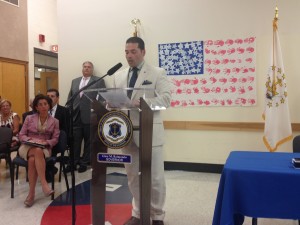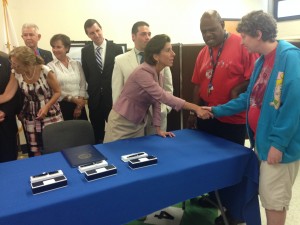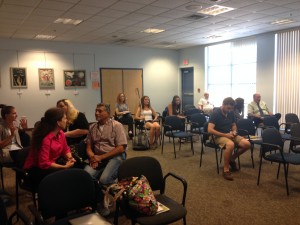Representative Robert Nardolillo, an Republican from District 28, and Senator Adam Satchell, a Democrat from District 9, sponsored the bipartisan act. Both legislators said that they decided to take on the bill because of their experiences with disabled children and their families. Satchell, who is a guidance teacher in the West Warwick, said that he works with disabled children all day, and has done so for years, even before he started teaching.

“I grew up next to a little boy who was disabled, and I learned a lot from him and from his family about the struggles that they go through,” he said. “I have friends who have a disabled child. So, working with the disabled has been something that I really wanted to do from the second I got elected.”
Satchell said that in West Warwick, schools are trying to bring the disabled population back in from outside placement. This move has given him the opportunity to work with both disabled and non-disabled students in the same room, in character education activities, teaching children how to respect and be kind to everyone.
“We have disabled individuals in the classroom, and its awesome to see the little kids helping their friend who can’t speak. They come up to me and say “Oh can I help this one, can I work with that one,” and it’s just awesome to see,” he said.
Having spoken with parents of these children, Satchell said that one of their biggest worries is what will happen when their children are not in school anymore. The ABLE program will hopefully quell that concern, and give parents the funds to send their children to adult daycare, or obtain job training.
While on his campaign trail, Nardolillo also spoke with parents of disabled children in his district, and decided to take on the act to help them.
“When I thought about what would be important to me to be important to me, to begin my session with, I concentrated on why I’m campaigning to be a legislator, and that’s public service,” he said. “You reflect on all the stories you heard going door to door. I’m a huge supporter of small business and trying to find jobs, but I’m a family man too.”
Nardolillo said that while speaking with these families, he realized that their children are their sole concern. When he began the session, he was looking for legislation that would have a positive and lasting impact on these families. While there is still more work to be done, and regulations that must be implemented, Nardolillo believes that this is a positive first step in the right direction.
The ABLE Act allows familes to put in $14,000 in state sanctioned accounts each year, with a $100,000 cap. This money is not taxed, and can be put towards a disabled child’s future, when they age out of the school system. Nardolillo added that these funds become even more important when a disabled individual wants to begin working.

“They want to work. They enjoy being out there, and socializing, and we all do,” he said. “We all love our jobs and like to socialize and everything, and this is a nice gateway. It opens the door to that, and that’s a special thing too.”
Both Satchell and Nardolillo also remarked that they anticipate no negative effects on the economy once the act is implemented, only positive ones.
“I can’t imagine what the negative impact of something like this would cause,” Nardolillo said. “Any time you offer someone opportunity, and you offer them a protection with an account like this, that allows them to put assets aside to protect their future, it’s hard for me to find a negative in that, it really is.”
“It wouldn’t have a negative effect on the economy, because a lot of these people basically have no assets to receive some of these services,” Satchell added. “If these people had any money, they weren’t using it, because if they have that money, and they have those assets, they run the risk of losing their programming.”
Before signing the act, Governor Raimondo gave her own remarks, saying that the ABLE accounts give Rhode Islanders the agency they deserve.
“This is about allowing people to have opportunity and independence, and fulfillment in their lives,” she said. “With these ABLE accounts, it will allow everybody to have some measure of independence, which is what people deserve.”
General Treasurer Seth Magaziner was also involved in the crafting of the bill, and said that he took a personal interest because his girlfriend’s brother was born with Down syndrome. Magaziner mentioned that he has seen the difficulties that their family has encountered trying to transition his girlfriend’s brother, named Peter, into adult life.
“Children who suffer from disabilities are just as deserving of a rich and fulfilling life than those children who are fortunate enough to pursue higher education,” he said. “Under this new law, our state will provide an affordable, tax-efficient savings plan to help families save for the costs of helping a child with disabilities make the transition into adulthood.”
]]>
The forum hosted a number of healthcare professionals, who specialize in a number of care outlets for disabled patients. Different groups that were represented included the Disability Law Center, the National Multiple Sclerosis Society, the Ocean State Center for Independent Living, and the Office of Rehabilitation Services, among others. But, rather than the professionals taking up the time to speak, many community members came forward, expressing how they believe Rhode Island can do better in terms of accessibility.
Barbara Henry, a blind woman who cannot drive, frequents RIPTA, which has proven problematic for her on more than one occasion.
“When the bus pulls up, I have no idea what bus it is,” she said. “They do not announce the bus, and I feel they really discriminate against anyone who is visually impaired, or print disabled, or anything for that matter.”
Henry’s problems have ranged from not knowing that a stop had been changed, to dealing with the newly renovated Kennedy Plaza, which she said is not accessible at all. While the stop names are in braille, the bus numbers that go through those stops are not, and the bus drivers do not announce which bus they are driving.
“My bus stop is G, but my bus number is 33,” she said. “There’s the 33, the 56, and the 54 that go out of that one stop. There’s nothing in braille that indicates that. If you were standing there, I would have to come up to you, and ask, “What bus is this?” And when the bus pulls up, there’s no audio announcement.”
Henry, who advocated, in her own words, “like hell,” for braille at Kennedy Plaza, feels as though her community is not taken seriously. Henry said that she attends the RIPTA community meetings, advocating for other blind people, because there is nothing tactile for them to process when they are finding their stop, not even a map.
“Since it’s been open since January, I’m still trying to process, make a mental map, of where everything is. They didn’t make any type of map or anything,” she said.
When Kennedy Plaza reopened earlier this year, RIPTA staff were there to assist passengers and direct them where to go, but Henry said that there was nobody to specifically help disabled riders.
Henry said that these issues don’t just affect blind people, though. Many other disabled riders struggle with RIPTA, including those who are deaf, autistic, or impaired in some other fashion. Such treatment has lead Henry to believe that RIPTA discriminates against the disabled.
“I truly, truly believe, that they do discriminate against the disabled,” she said. “I feel that my safety is placed at risk.”
Kristin Clark went to the forum to represent her friend, who is disabled and experienced mistreatment and belligerent service at the hands of the Wakefield SNAP office when trying to get certified for her benefits. Clark’s friend, who was not named, went into her local Wakefield office rather than conducting a phone interview with the main Providence office.
“The staff apparently relies on phone interviews, even though they are told they can come into offices to do the recertification,” Clark said. “When she came into the office, she was treated very badly, and very hostilely, and was told several times that SNAP would be cancelled for her, and that she would have to pay back what they said was an overpayment, and now she’s left not knowing what her situation is.”
Clark added that Rhode Island Housing has been helpful for her friend and her son, who is also disabled, because she is part of section 8 housing. SNAP, on the other hand, has caused a whole host of problems for her. Clark has even spoken to Congressman Jim Langevin’s (D- District 2), who looked into the problem and asked that they also speak to the Department of Health. When her friend called, the Department of Health was not only rude to her again, but also defended the SNAP office’s treatment towards her.
“By the end of the call, my friend was just a mess, and as of right now, has no idea what her situation is,” she said. “She does not know if she’s cancelled, she does not know if somebody is going to come after her for that money that they say she was overpaid, she does not know if, come Aug. 1, if she is going to have any SNAP benefits.”
Raffi Jansezian, a staff member for the GCD, explained how their office plans to move forward with these issues.
“After all the forums are done after this week, and after all the transcripts are finalized, I’ll be going through them, personally reading them as well as running different focus groups to analyze the transcripts, to figure out which problems are coming up over and over again,” he said.
Once that process is completed, they then move to begin writing solutions for these pressing issues into legislation, and create laws that can benefit everyone who has been affected and come to them to voice their concerns.
Jansezian added that Governor Gina Raimondo has shown “fantastic” support for the GCD, and that they have already made some strides towards what they hope to accomplish.
]]>